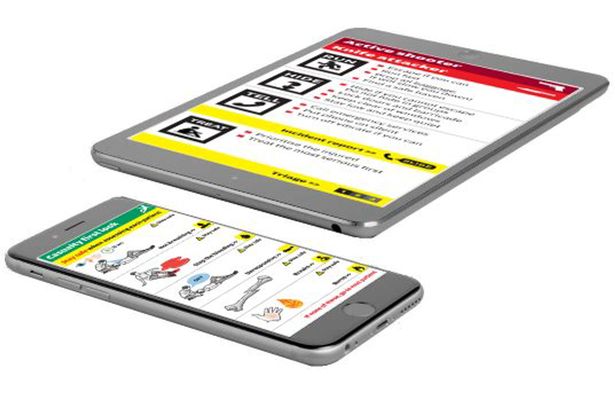After Run, Hide, Tell . . . a life-saving appliance of science in event of a terror attack
Counter-terror techniques honed against so-called Islamic State (Daesh) are being rolled out to the public as the UK braces itself for an Istanbul-style atrocity.
Counter-terror techniques honed against so-called Islamic State (Daesh) are being rolled out to the public as the UK braces itself for an Istanbul-style atrocity. An app devised by senior military medics details how to react in a terror attack to save lives. Backed by the National Counter Terrorism Security Office (NCTSO), the CitizenAID WhatsApp has been released with the risk of such an attack `highly likely`. It advises what to do if first on the scene and on using a tourniquet to treat injuries seen on the battlefields of Iraq, or in terror attacks around the world. The information available through the app and accompanying pocketbook is designed to complement the Run, Hide, Tell guidance given by the NTCSO in the wake of the Paris attacks. Sir Keith Porter, professor of clinical traumatology at the University of Birmingham, is one of four clinicians behind the initiative. He said: “I have treated hundreds of soldiers whose lives have been saved by simply the application of tourniquets when they have been shot or blown up. Teaching individual soldiers these skills has saved lives. “And I think it is essential we train the public in those skills and that is exactly what CitizenAID does. Sir Keith was approached by Brigadier Tim Hodgetts of the Defence Medical Services who said his experience rescuing victims from a bombed hospital in Belfast in 1991 had helped inform its development. He added: “Reflecting on this experience I was convinced that to do better in the future we must have a simple system that could be applied to any incident. “A system that would take away the initial uncertainty of what to do first, when there is so much to do. A system that would help to prioritise the injured, so the limited resources can reliably be used to treat the most seriously injured first.” The pair and other senior medics devised a checklist on dealing with a shooter, a knife attacker, and suspected and exploded bombs. Andrew Thurgood, a consultant nurse who co-created the app, said: “We know that the earlier we react effectively to incidents with multiple casualties the more survivors we see. “Every incident has one thing in common: the public will be there. And they will be there even if the emergency services are not. As an emergency nurse working in both the hospital and the pre-hospital setting I have seen patients who have received awful injuries and have only survived because of the quick thinking of a member of the public. “Many of these people who have stepped forward and helped do not understand how important these simple actions were.” He said the app could help members of the public “navigate through the chaos” if caught up in a terror attack. The guide, available to download for free, includes advice on how to make and use a tourniquet safely to stem blood loss one of the major causes of death following attacks. There were five terrorist attacks that claimed multiple lives in Europe last year, including the Bastille Day lorry horror that left 89 dead in Nice and the Christmas market massacre in which 12 people were killed in Berlin last month. Thirty-nine people were killed when a gunman opened fire in a nightclub in Istanbul in the early hours of January 1 this year. Europol warned in December that dozens of Daesh fanatics were in Europe ready to attack, with Britain among the countries considered a prime target.


